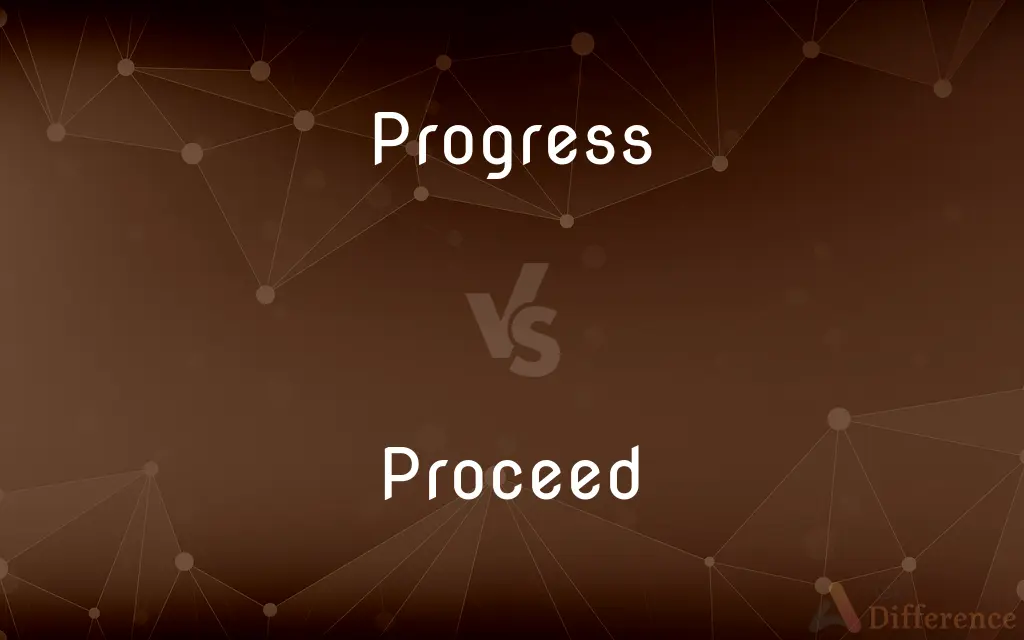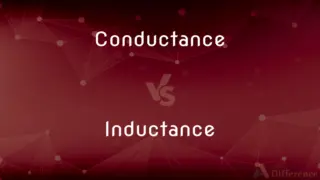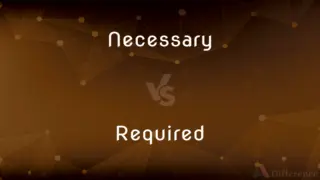Progress vs. Proceed — What's the Difference?
By Maham Liaqat & Fiza Rafique — Updated on April 5, 2024
Progress implies moving forward or advancement towards a goal, while proceed means to continue forward or begin a course of action.

Difference Between Progress and Proceed
Table of Contents
ADVERTISEMENT
Key Differences
Progress is often used to describe forward movement or advancement in a particular task, project, or goal. It indicates a measure of success or development over time, reflecting improvement or growth. On the other hand, proceed refers to the act of moving forward or continuing on a path or course of action, often without implying any measure of success or completion. It's more about the action of moving ahead rather than the achievement of moving ahead.
While progress is typically associated with positive change or development in various contexts such as technology, personal growth, or societal improvements, proceed is a more general term that implies action or movement without necessarily indicating improvement. For instance, you can proceed with a plan without it leading to progress.
In the realm of personal development, making progress implies that a person is achieving their goals and improving themselves in some way. Conversely, to proceed in this context simply means to continue with one’s efforts or actions toward their goals, without the implication of improvement or success.
Projects and initiatives are often said to progress when milestones are reached or objectives are met, showcasing advancement towards completion. However, to proceed with a project means to continue with planned actions or next steps, regardless of the level of success or advancement already achieved.
The assessment of progress often involves qualitative or quantitative measures to evaluate advancement or improvement, such as benchmarks, milestones, or KPIs (Key Performance Indicators). Proceed, however, does not inherently require such measures, as it focuses on the continuation of actions or processes rather than their outcomes.
ADVERTISEMENT
Comparison Chart
Definition
Forward movement towards a goal or higher state.
To continue or begin a specific course of action.
Implication
Implies improvement, advancement, or development.
Implies continuation or initiation without inherent progress.
Context
Often used in the context of development or improvement.
Used to describe the act of moving forward or onwards.
Measure
Measured by success, achievement, or advancement.
Not necessarily measured; focuses on action.
Examples
Progress in technology, personal growth, societal improvements.
Proceed with a plan, continue a journey, start an action.
Compare with Definitions
Progress
Improvement or development over time.
Her progress in learning a new language was impressive.
Proceed
To begin a course of action.
Once the plan was approved, they proceeded with implementation.
Progress
Movement towards a better or more developed state.
Society’s progress in renewable energy usage is encouraging.
Proceed
To go on to do something.
After finishing his degree, he proceeded to work in his field of study.
Progress
Advancement towards a goal.
The team noted significant progress in the project's development phase.
Proceed
To carry on with an action.
She decided to proceed with caution in the negotiations.
Progress
Achievement of milestones.
We celebrate the progress made in civil rights over the decades.
Proceed
To continue forward.
After the break, the lecturer proceeded with the lesson.
Progress
The process of getting better at a skill or task.
His progress in piano playing was evident at the recital.
Proceed
To move ahead with a process.
The committee will proceed with the evaluation tomorrow.
Progress
Forward or onward movement, as toward a destination
We made little progress on our way home because of the traffic.
Proceed
Begin a course of action
The consortium could proceed with the plan
Progress
Development, advancement, or improvement, as toward a goal
The math students have shown great progress.
Proceed
Move forward
From the High Street, proceed over Magdalen Bridge
Progress
A ceremonial journey made by a sovereign through that sovereign's realm.
Proceed
Originate from
His claim that all power proceeded from God
Progress
To move forward or onward
The ship progressed toward the equator.
Proceed
To go forward or onward, especially after an interruption; continue
Proceeded to his destination.
Paused to clear her throat, then proceeded.
Progress
To develop, advance, or improve
Research progressed on the new vaccine.
Proceed
To begin to carry on an action or a process
Looked surprised, then proceeded to roar with laughter.
Progress
To increase in scope or severity, as a disease taking an unfavorable course.
Proceed
To move on in an orderly manner
Business proceeded as usual.
Progress
Movement or advancement through a series of events, or points in time; development through time.
Testing for the new antidote is currently in progress.
Proceed
To come from a source; originate or issue
Behavior proceeding from hidden motives. ].
Progress
Specifically, advancement to a higher or more developed state; development, growth.
Science has made extraordinary progress in the last fifty years.
Proceed
(intransitive) To move, pass, or go forward or onward; to advance; to carry on
To proceed on a journey
Progress
An official journey made by a monarch or other high personage; a state journey, a circuit.
Proceed
(intransitive) To pass from one point, topic, or stage, to another.
To proceed with a story or argument
Progress
A journey forward; travel.
Proceed
(intransitive) To come from; to have as its source or origin.
Light proceeds from the sun.
Progress
Movement onwards or forwards or towards a specific objective or direction; advance.
The thick branches overhanging the path made progress difficult.
Proceed
(intransitive) To go on in an orderly or regulated manner; to begin and carry on a series of acts or measures; to act methodically
Progress
(intransitive) To move, go, or proceed forward; to advance.
Visitors progress through the museum at their own pace.
Proceed
(intransitive) To be transacted; to take place; to occur.
Progress
(intransitive) To develop.
Societies progress unevenly.
Proceed
To be applicable or effective; to be valid.
Progress
(by extension) To improve; to become better or more complete.
Proceed
To begin and carry on a legal process.
Progress
(transitive) To expedite.
Proceed
(intransitive) To take an academic degree.
Progress
A moving or going forward; a proceeding onward; an advance
Proceed
To move, pass, or go forward or onward; to advance; to continue or renew motion begun; as, to proceed on a journey.
If thou proceed in this thy insolence.
Progress
A journey of state; a circuit; especially, one made by a sovereign through parts of his own dominions.
The king being returned from his progresse.
Proceed
To pass from one point, topic, or stage, to another; as, to proceed with a story or argument.
Progress
To make progress; to move forward in space; to continue onward in course; to proceed; to advance; to go on; as, railroads are progressing.
Let me wipe off this honorable dew,That silverly doth progress on thy checks.
They progress in that style in proportion as their pieces are treated with contempt.
The war had progressed for some time.
Proceed
To issue or come forth as from a source or origin; to come from; as, light proceeds from the sun.
I proceeded forth and came from God.
It proceeds from policy, not love.
Progress
To make improvement; to advance.
If man progresses, art must progress too.
Proceed
To go on in an orderly or regulated manner; to begin and carry on a series of acts or measures; to act by method; to prosecute a design.
He that proceeds upon other principles in his inquiry.
Progress
To make progress in; to pass through.
Proceed
To be transacted; to take place; to occur.
He will, after his sour fashion, tell youWhat hath proceeded worthy note to-day.
Progress
Gradual improvement or growth or development;
Advancement of knowledge
Great progress in the arts
Proceed
To have application or effect; to operate.
This rule only proceeds and takes place when a person can not of common law condemn another by his sentence.
Progress
The act of moving forward toward a goal
Proceed
To begin and carry on a legal process.
Progress
A movement forward;
He listened for the progress of the troops
Proceed
See Proceeds.
Progress
Develop in a positive way;
He progressed well in school
My plants are coming along
Plans are shaping up
Proceed
Continue with one's activities;
I know it's hard,
But there is no choice
Carry on--pretend we are not in the room
Progress
Move forward, also in the metaphorical sense;
Time marches on
Proceed
Move ahead; travel onward in time or space;
We proceeded towards Washington
She continued in the direction of the hills
We are moving ahead in time now
Progress
Form or accumulate steadily;
Resistance to the manager's plan built up quickly
Pressure is building up at the Indian-Pakistani border
Proceed
Follow a procedure or take a course;
We should go farther in this matter
She went through a lot of trouble
Go about the world in a certain manner
Messages must go through diplomatic channels
Proceed
Follow a certain course;
The inauguration went well
How did your interview go?
Proceed
Continue a certain state, condition, or activity;
Keep on working!
We continued to work into the night
Keep smiling
We went on working until well past midnight
Common Curiosities
What does progress mean?
Progress refers to forward movement or advancement towards achieving a goal, indicating improvement or development.
Is proceeding always part of progress?
Proceeding is a necessary action for progress, but proceeding with something does not always result in progress.
Can progress be measured?
Yes, progress is often measured by specific achievements, improvements, or the attainment of goals.
How is proceed different from progress?
Proceed means to continue or begin a course of action, focusing on the act of moving forward without necessarily indicating improvement or success.
Can progress be negative?
While progress typically implies positive advancement, in some contexts, it can be viewed negatively if it leads to undesirable outcomes.
Is it possible to proceed too quickly?
Yes, proceeding too quickly without careful planning or consideration can lead to mistakes or overlook important details.
What motivates individuals to make progress?
Motivations can include personal satisfaction, achievement of goals, recognition, and the desire for improvement.
How do organizations measure progress?
Organizations measure progress through benchmarks, milestones, and KPIs to evaluate advancement or success.
Why is progress important in projects?
Progress indicates that a project is moving towards its completion goals, demonstrating development and achievement.
What does it mean to proceed with caution?
To proceed with caution means to continue forward while being careful and mindful of potential risks or issues.
How do personal goals relate to progress and proceeding?
Personal goals often require both proceeding with actions and making progress in achieving those goals for successful outcomes.
How does society benefit from progress?
Societal progress in areas like technology, health, and education can lead to improved living standards and solutions to global challenges.
What role does feedback play in progress?
Feedback is crucial for identifying areas of improvement and ensuring continued progress towards goals.
Can an individual proceed without making progress?
Yes, an individual can continue actions or efforts (proceed) without necessarily achieving improvement or success (progress).
How can one ensure they proceed effectively?
Effective proceeding requires careful planning, understanding of objectives, and adaptable strategies to navigate challenges.
Share Your Discovery

Previous Comparison
Conductance vs. Inductance
Next Comparison
Necessary vs. RequiredAuthor Spotlight
Written by
Maham LiaqatCo-written by
Fiza RafiqueFiza Rafique is a skilled content writer at AskDifference.com, where she meticulously refines and enhances written pieces. Drawing from her vast editorial expertise, Fiza ensures clarity, accuracy, and precision in every article. Passionate about language, she continually seeks to elevate the quality of content for readers worldwide.
















































